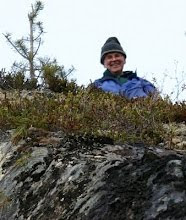Gerald Van De Wiele oli taideopiskelijana 1950-luvulla Black Mountain Collegessa jossa Charles Olson oli ohjaajana.
Runo on vahvasti Rimbaud-vaikutteinen. Kanukka-runo on mielenkiintoinen tulkinta sanojen eri merkityksistä variaatiomahdollisuuksineen, voisi aloittaa vaikkapa näinkin:
Osa 1, Onnellisuus
Kanukka lehväilee
mikä on vihreää
omenapuusta
puhaltuu tielle
terälehtiä
vaikertavat kyyhkyt
huomioivat
iltapäivän huojunnan, mehiläiset
kaivavat luumun kukkia
aamu
nousee suoraan ylös, yö
on sininen täydestä huhtikuun kuusta
iiris ja lilja, linnut
linnut, keltaisia kukkia
valkeita kukkia, Diesel
ei hellitä
auran kiskomista
kun yökehrääjä,
yön traktori, virnuilee
lauluaan
eikä muut linnut paitsi me
ole yhtä ahkeria
(O saisons, o chateaux!
Délires!
(Oi vuodenajat, oi linnat! Harhaluulot!)
Mikä sielu
on ilman vikaa?
Kukaan ei opiskele
onnellisuutta
Aina kun kukko laulaa
tervehdin häntä
Minulla ei ole enää mitään tekosyytä
kateuteen. Elämäni
on antanut ohjeensa: vuodenajat
takertuvat
sielu ja ruumis, minkään levittyneen
vaivan pilkanteko. Kuoleman tunti
on ainoa tunkeutuja
II. Maksu
Kanukka lehväilee
vihreän
omenapuun terälehdet
putoavat jalkoihin kävellä päällä
lintuja on niin monta
äänekkäitä, iltapäivällä
ne häiritsevät, kuten niin monet mehiläiset
tekevät äkkiä ympäriinsä
Kevään tullessa tietää tänään
nähdä että aamulla kaikki asiat
erikseen paitsi keskipäivällä
ne sulautuvat itse kuhunkin
ja yöllä vain hullut asiat
kuten täysikuu ja kehrääjä
ja me, ollaan kiireisiä. Meillä on kiire
jos vain selviämme tuosta viiksilinnusta,
tuosta kehrääjästä, ja pääsemme yli, kuu
on meidän keskustelu, nainen haluaa sanoa
mikä sielu
ei ole ajoissa?
onko sinulla varaa olla tekemättä
maagista tutkielmaa
siitä mitä onnellisuus on? kuuletko
kukon kun hän kiekuu? tunnetko
syytöksen että et kadehdi, että sinun
elämälläsi on ohjeensa, että vuodenajat
tarraavt sinuunkin, ettei kukaan ja sielu ole yhtä
jollei niitä ole pakotettu
tähän vastaiskuun? Ja että muuten ponnistelut
ovat ponnistuksia? Ja että sinun lentotuntisi
tulee olemaan sinun kuolemisesi tunti?
III Kevät
Kanukka
sytyttää päivän.
Huhtikuun kuu
leijuttaa yön.
Linnut, äkkiä,
ovat lukuisat
Mehiläiset ruttaavat
kukat, hedelmän kukat
heitetään maahan, tuuli
sade pakottaa kaikkea. Ääni -
jopa yökehrääjät rummuttavat
yötä, ja me olemme
yhtä kiireisiä, kynnämme, liikumme,
pakenemme, rakastamme. Salaisuus
mikä eksyi eikä kätke
tai paljasta itseään, esittää
todisteet. Ja me ryntäämme
samalle tasolle. Keho
piiskaa sielua. Se vaatii
himossaan elämännestettä
Kevään kohinassa,
muodonmuutoksia. Kateus
raahaa itseään pois. Ruumiin ja sielun vika
- että ne eivät ole yhtä -
aamuvarhainen kukko kalahtaa
ja yksinäisyys: tervehdimme sinua
ei hutiloinnin vuodenaikaa
Pitkin Olsonin sanavalintoja oli monasti kiusaus lähteä synonyymien harhapoluille.
En sittenkään ole ihan varma ovatko minun valintani mitä Olson tarkoitti.
Välillä tuli tunne että hän sisällytti tietoisesti sananvalintojensa yksiselitteistä kirjoa laajemman tulkinnan alkutekstiinsä.
Variaatioiden sisäkkäisyys, monimielisyys??
Olisi kiva jos tästä joku intoutuisi heittämään tulkinnan säilää.
Tutkijat ovat myös maininneet ykkösvariaation olevan rytmillisen vastineen William Carlos Williams'n runoon Portrait of a Lady, (jonka liitän kommenttiosastolle.) Tom Clark on löytänyt myös Olsonin variaatiosta kaikuja Wallace Stevens'sin runosta Sea Surface Full of Clouds. Liitin senkin kommentiksi!
Aina voi miettiä että mitä Mr. Olson oikeastaan sanoillaan pyöritteleekään. Kun sanoilla on merkitys, muitakin, onko kyseessä aina verbi vai monikko substantiivista. Siinä sitä saisi aikaansa kulumaan, herkutellessa. Eli ikäänkuin variaatioista voisi esittää erilaisia variaatioita.
Niinhän niistä voikin. Rytmillisiä, mielleyhtymiä.
Olsonista erikseen:
http://juhanitikkanen.blogspot.com/2008/10/charles-olson-maximus-poems.html
lauantai 24. toukokuuta 2008
Tilaa:
Lähetä kommentteja (Atom)





2 kommenttia:
William Carlos Williams - Portrait Of A Lady
Your thighs are appletrees
whose blossoms touch the sky.
Which sky? The sky
where Watteau hung a lady's
slipper. Your knees
are a southern breeze—or
a gust of snow. Agh! what
sort of man was Fragonard?
—As if that answered
anything.—Ah, yes. Below
the knees, since the tune
drops that way, it is
one of those white summer days,
the tall grass of your ankles
flickers upon the shore—
Which shore?—
the sand clings to my lips—
Which shore?
Agh, petals maybe. How
should I know?
Which shore? Which shore?
—the petals from some hidden
appletree—Which shore?
I said petals from an appletree.
Sea Surface Full Of Clouds
Wallace Stevens
I
In that November off Tehuantepec,
The slopping of the sea grew still one night
And in the morning summer hued the deck
And made one think of rosy chocolate
And gilt umbrellas. Paradisal green
Gave suavity to the perplexed machine
Of ocean, which like limpid water lay.
Who, then, in that ambrosial latitude
Out of the light evolved the morning blooms,
Who, then, evolved the sea-blooms from the clouds
Diffusing balm in that Pacific calm?
C’était mon enfant, mon bijou, mon âme.
The sea-clouds whitened far below the calm
And moved, as blooms move, in the swimming green
And in its watery radiance, while the hue
Of heaven in an antique reflection rolled
Round those flotillas. And sometimes the sea
Poured brilliant iris on the glistening blue.
II
In that November off Tehuantepec
The slopping of the sea grew still one night.
At breakfast jelly yellow streaked the deck
And made one think of chop-house chocolate
And sham umbrellas. And a sham-like green
Capped summer-seeming on the tense machine
Of ocean, which in sinister flatness lay.
Who, then, beheld the rising of the clouds
That strode submerged in that malevolent sheen,
Who saw the mortal massives of the blooms
Of water moving on the water-floor?
C’était mon frère du ciel, ma vie, mon or.
The gongs rang loudly as the windy booms
Hoo-hooed it in the darkened ocean-blooms.
The gongs grew still. And then blue heaven spread
Its crystalline pendentives on the sea
And the macabre of the water-glooms
In an enormous undulation fled.
III
In that November off Tehuantepec,
The slopping of the sea grew still one night
And a pale silver patterned on the deck
And made one think of porcelain chocolate
And pied umbrellas. An uncertain green,
Piano-polished, held the tranced machine
Of ocean, as a prelude holds and holds,
Who, seeing silver petals of white blooms
Unfolding in the water, feeling sure
Of the milk within the saltiest spurge, heard, then,
The sea unfolding in the sunken clouds?
Oh! C’était mon extase et mon amour.
So deeply sunken were they that the shrouds,
The shrouding shadows, made the petals black
Until the rolling heaven made them blue,
A blue beyond the rainy hyacinth,
And smiting the crevasses of the leaves
Deluged the ocean with a sapphire blue.
IV
In that November off Tehuantepec
The night-long slopping of the sea grew still.
A mallow morning dozed upon the deck
And made one think of musky chocolate
And frail umbrellas. A too-fluent green
Suggested malice in the dry machine
Of ocean, pondering dank stratagem.
Who then beheld the figures of the clouds
Like blooms secluded in the thick marine?
Like blooms? Like damasks that were shaken off
From the loosed girdles in the spangling must.
C’était ma foi, la nonchalance divine.
The nakedness would rise and suddenly turn
Salt masks of beard and mouths of bellowing,
Would—But more suddenly the heaven rolled
Its bluest sea-clouds in the thinking green,
And the nakedness became the broadest blooms,
Mile-mallows that a mallow sun cajoled.
V
In that November off Tehuantepec
Night stilled the slopping of the sea.
The day came, bowing and voluble, upon the deck,
Good clown… One thought of Chinese chocolate
And large umbrellas. And a motley green
Followed the drift of the obese machine
Of ocean, perfected in indolence.
What pistache one, ingenious and droll,
Beheld the sovereign clouds as jugglery
And the sea as turquoise-turbaned Sambo, neat
At tossing saucers—cloudy-conjuring sea?
C’était mon esprit bâtard, l’ignominie.
The sovereign clouds came clustering. The conch
Of loyal conjuration trumped. The wind
Of green blooms turning crisped the motley hue
To clearing opalescence. Then the sea
And heaven rolled as one and from the two
Came fresh transfigurings of freshest blue.
Lähetä kommentti